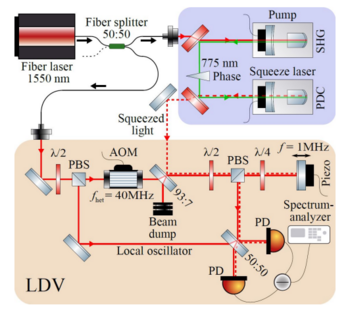Squeezed Light at visible wavelength for eye-safe high-spatial-resolution surface microscopy
This research was funded as part of the DFG project " Gequetschtes Licht bei sichtbarer Wellenlänge für augensichere Oberflächenmikroskopie mit hoher räumlicher Auflösung " (project number 431078650).
1. State of the Art
- Conventional LDV (Laser Doppler Vibrometry) technology employs homodyne and heterodyne interferometry methods to measure mechanical vibrations with high precision.
- When combined with confocal microscopy—which provides excellent lateral resolution through a tightly focused laser spot—even minor surface topographies and vibrations can be analyzed.
- Higher laser power for focusing is not feasible due to safety concerns and thermal effects. Lower power, however, results in poor signal-to-noise ratio (SNR).
- Squeezed light represents a groundbreaking advancement in this regard. By leveraging quantum effects, it reduces statistical fluctuations in photon shot noise. The use of squeezed light in a vacuum state does not increase light intensity and thus does not raise laser power.
2. Objective
- The goal is to develop a system that utilizes squeezed light and confocal scanning microscopy to measure surface topographies with outstanding lateral resolution—while operating at visible wavelengths that remain eye-safe.
3. Methods
- Development of a high-precision green LDV combined with confocal microscopy to enhance resolution.
- Due to the properties of squeezed light, the entire optical setup should exhibit minimal light loss.
- Optimization of the detector using clipping and demodulation techniques [1] to overcome conventional signal-to-noise limitations.
- Utilization of nonlinear optical resonators to generate squeezed light. The development of the squeezed light source is led by Prof. Schnabel's team at the University of Hamburg.
- Combination of confocal scanning microscopy with squeezed light to improve resolution and reduce shot noise.

![[Translate to English:] [Translate to English:]](/fileadmin/_processed_/b/2/csm_KT_MPV_1a049c53c4.jpg)